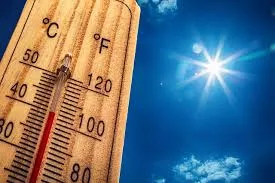We are now in the hottest time of year. Temperatures in the 90’s and high humidity make it very uncomfortable to be outside. None of us have been a stranger to this season’s hot weather throughout the country.
But even in the miserable hot temperatures most wouldn’t have thought HEAT to be the most dangerous weather related event. Heat accounts for more deaths than does lightning, floods, tornados, and the cold combined in some  year’s averages. It is a serious life threatening risk we are all exposed to at the highest levels almost continually for months.
year’s averages. It is a serious life threatening risk we are all exposed to at the highest levels almost continually for months.
Heat is a killer. When the temperatures continue to rise, the body can become overheated and struggle to cool itself properly. In excess heat, it becomes easy to become dehydrated because of an excess amount of sweating as the body attempts to cool itself. Relative humidity is an important factor in developing heat exhaustion. In our region of western Kentucky and Tennessee that experience high levels of humidity, the evaporation rate is significantly lower causing difficulty for your body to stay cool. Sweat helps keep you cool as it evaporates, but the humid conditions make evaporation difficult. If you haven't been in the heat in many weeks or months, just be aware that your body will not handle it as well as it may have in the past when you were acclimatized. It takes about 7 to 10 days for the body to adapt to hot weather.  A non-acclimated person can produce a liter or almost a quart of sweat in an hour to assist in cooling the body.
A non-acclimated person can produce a liter or almost a quart of sweat in an hour to assist in cooling the body.
A person who is acclimated to the heat can produce 2 or 3 liters of sweat per hour. The body cools itself most efficiently by sweating and having that sweat evaporate. Should sweating be unable to meet the cooling demands of the body, heat-related illness can occur. This includes dehydration, heat cramps, then heat exhaustion, and finally to heat stroke, a life-threatening medical condition. Heat exhaustion symptoms can include profuse sweating, weakness, nausea, vomiting, headaches, and muscle spasms. The affected individual may have a low grade fever.
Heat stroke is a life-threatening situation where the body's cooling system fails. The body temperature spirals out of control usually greater than 106F (41 C), s weating stops, and there are mental status changes like confusion, seizure, or coma. Heat exhaustion occurs when a person exercises and works in a hot environment and the body cannot cool itself adequately. Heat exhaustion usually can be treated at home as long as the affected individual can maintain proper hydration and find a cool place to rest. Water, electrolyte replacement solutions or sport drinks are appropriate to consume. If nausea and vomiting prevent rehydration, the individual should seek medical attention, and may need IV fluids for rehydration.
weating stops, and there are mental status changes like confusion, seizure, or coma. Heat exhaustion occurs when a person exercises and works in a hot environment and the body cannot cool itself adequately. Heat exhaustion usually can be treated at home as long as the affected individual can maintain proper hydration and find a cool place to rest. Water, electrolyte replacement solutions or sport drinks are appropriate to consume. If nausea and vomiting prevent rehydration, the individual should seek medical attention, and may need IV fluids for rehydration.
A person at risk for heat exhaustion should watch their urine output to monitor their hydration status. If the body is dehydrated, the kidneys will hold onto water, and make concentrated, strong smelling urine. If enough water is present, the urine will turn clear. Individuals who have suffered from heat exhaustion are more prone to experience another episode and should be cautious when working or exercising in hot conditions. By following common sense heat safety rules, you should still be able to enjoy the great outdoors. Feel free to leave comments and be sure to hit the “Like” button at the end of this post.






